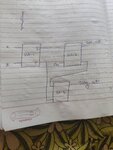Prameeth
Newbie level 4

Hi
I was wondering about implementing a full adder using ONLY half adders and no other gates by assuming half adder as a black box. Can someone please help in this regard.
I was wondering about implementing a full adder using ONLY half adders and no other gates by assuming half adder as a black box. Can someone please help in this regard.


